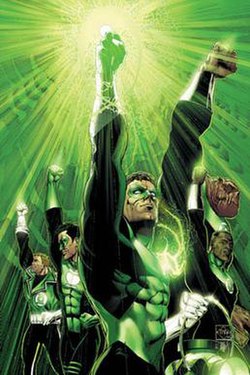
AT A RECENT PROMO screening of "Green Lantern," a few hundred avid comic book fans flawlessy answered the most obscure questions radio DJs could throw at them.
There was no stumping these people. They knew everything about every iteration of Hal Jordan, every narrative evolution of the DC character, the name of every illustrator, every writer.
You don't get that deeply into the Green Lantern without an obvious passion for the subject.
Almost none of that passion is on display in the workmanlike "Lantern" movie - a by-the-book Hollywood tentpole that exhibits competent blockbuster craftsmanship, but no special feel for the material at hand.
Making superhero movies is a tough gig right now. The more comic book franchises that hit the screen, the harder it becomes for any one of them to make an impression.
The most recent to do so was "X-Men: First Class," given a new cast and groovy '60s makeover by UK hipster Matthew Vaughn. He was able to summon some of the creative energy that Chris Nolan brought to "The Dark Night," or Jon Favreau (in a comic way) to "Iron Man."
The "Green Lantern" director is Martin Campbell, a talented journeymen, but a guy with no obvious affinity for the superhero genre, or for this particular character.
Nobody involved seems to know how seriously to take the story - that of a hotshot pilot, Hal Jordan (Ryan Reynolds), nominated by a dying alien to join a galactic force of heroes (powered by will) who fight interstellar evil (powered by fear).
Reynolds has always excelled at slightly facetious line readings and he's best suited to comedy. He's most comfortable in half-serious scenes, played for slapstick laughs as Jordan adjusts to his superpowers, his new body suit.
The thin strip of green meant to mask his true identity is an old-fashioned farce, so "Lantern" turns it into a joke - Jordan's love interest (Blake Lively) sees right through it.
Moments that require soul-stirring conviction from Reynolds play less well, but you have to feel for him - in almost every big, serious scene, he's acting in an empty room against a green screen.
My personal rule of thumb is the more green screen and animation a superhero movie needs, the less interesting that movie becomes.
All Kevin Bacon needed to carve out a memorable villain in "First Class" was an ascot and a martini. "Green Lantern" doesn't even have a villain - just a gaseous cloud of fear with the head of Mr. Magoo.
Peter Sarsgaard tries to fill the void, in a smallish role as a scientist who gets fear goo on his finger and turns into an angry elephant man, but he's undone by goofball dialogue.
In one scene, he explains his new telepathic abilities to Angela Bassett.
"Physical contact allows access to mnemonic data."
Blank stare.
"I can see your memories."
A paraphrase, no doubt, of what he said to Blake Lively after viewing her online photos.
Read more: http://www.philly.com/philly/entertainment/movies/124028574.html#ixzz1PVuvNF8b
There was no stumping these people. They knew everything about every iteration of Hal Jordan, every narrative evolution of the DC character, the name of every illustrator, every writer.
You don't get that deeply into the Green Lantern without an obvious passion for the subject.
Almost none of that passion is on display in the workmanlike "Lantern" movie - a by-the-book Hollywood tentpole that exhibits competent blockbuster craftsmanship, but no special feel for the material at hand.
Making superhero movies is a tough gig right now. The more comic book franchises that hit the screen, the harder it becomes for any one of them to make an impression.
The most recent to do so was "X-Men: First Class," given a new cast and groovy '60s makeover by UK hipster Matthew Vaughn. He was able to summon some of the creative energy that Chris Nolan brought to "The Dark Night," or Jon Favreau (in a comic way) to "Iron Man."
The "Green Lantern" director is Martin Campbell, a talented journeymen, but a guy with no obvious affinity for the superhero genre, or for this particular character.
Nobody involved seems to know how seriously to take the story - that of a hotshot pilot, Hal Jordan (Ryan Reynolds), nominated by a dying alien to join a galactic force of heroes (powered by will) who fight interstellar evil (powered by fear).
Reynolds has always excelled at slightly facetious line readings and he's best suited to comedy. He's most comfortable in half-serious scenes, played for slapstick laughs as Jordan adjusts to his superpowers, his new body suit.
The thin strip of green meant to mask his true identity is an old-fashioned farce, so "Lantern" turns it into a joke - Jordan's love interest (Blake Lively) sees right through it.
Moments that require soul-stirring conviction from Reynolds play less well, but you have to feel for him - in almost every big, serious scene, he's acting in an empty room against a green screen.
My personal rule of thumb is the more green screen and animation a superhero movie needs, the less interesting that movie becomes.
All Kevin Bacon needed to carve out a memorable villain in "First Class" was an ascot and a martini. "Green Lantern" doesn't even have a villain - just a gaseous cloud of fear with the head of Mr. Magoo.
Peter Sarsgaard tries to fill the void, in a smallish role as a scientist who gets fear goo on his finger and turns into an angry elephant man, but he's undone by goofball dialogue.
In one scene, he explains his new telepathic abilities to Angela Bassett.
"Physical contact allows access to mnemonic data."
Blank stare.
"I can see your memories."
A paraphrase, no doubt, of what he said to Blake Lively after viewing her online photos.
Read more: http://www.philly.com/philly/entertainment/movies/124028574.html#ixzz1PVuvNF8b
0 comments:
Post a Comment